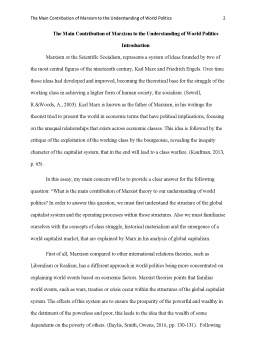Extras din referat
Introduction
Marxism or the Scientific Socialism, represents a system of ideas founded by two of the most central figures of the nineteenth century, Karl Marx and Friedrich Engels. Over time those ideas had developed and improved, becoming the theoretical base for the struggle of the working class in achieving a higher form of human society, the socialism. (Sewell, R.&Woods, A., 2003). Karl Marx is known as the father of Marxism, in his writings the theorist tried to present the world in economic terms that have political implications, focusing on the unequal relationships that exists across economic classes. This idea is followed by the critique of the exploitation of the working class by the bourgeoisie, revealing the inequity character of the capitalist system, that in the end will lead to a class warfare. (Kaufman, 2013, p. 63).
In this essay, my main concern will be to provide a clear answer for the following question: “What is the main contribution of Marxist theory to our understanding of world politics? In order to answer this question, we must first understand the structure of the global capitalist system and the operating processes within those structures. Also we must familiarise ourselves with the concepts of class struggle, historical materialism and the emergence of a world capitalist market, that are explained by Marx in his analysis of global capitalism.
First of all, Marxism compared to other international relations theories, such as Liberalism or Realism, has a different approach in world politics being more concentrated on explaining world events based on economic factors. Marxist theories points that familiar world events, such as wars, treaties or crisis occur within the structures of the global capitalist system. The effects of this system are to ensure the prosperity of the powerful and wealthy in the detriment of the powerless and poor, this leads to the idea that the wealth of some dependents on the poverty of others. (Baylis, Smith, Owens, 2016, pp. 130-131). Following this statement, we can observe that the global capitalism is dividing the world in two, the core as an exploiting force and the periphery as the exploited one. Later on Immanuel Wallerstein developed Marx’s ideas in a world-system theory, emphasizing the role of labour division and adding the concept of semi-periphery countries. In the 16th century the international division of labour in the core, semi-periphery and periphery countries determined their relationship to each other, the labour conditions and their political system. For example, most of the core countries, like England, France or Holland had central governments and extensive bureaucracies that helped them to obtain the control of international commerce, while the periphery countries that had weak central governments or were controlled by other countries, had been exploited by the core for their raw materials. (Halperin, S., 2013).The semi-periphery is situated somewhere between those two, having limited access to the production of high-cost and high-quality goods, draining resources from the periphery but being exploited afterwards by the core.
Bibliografie
Alfarsi, H. (2016) Inequality in capitalism according to Karl Marx. Retrieved on October 5, 2017 from the Version Daily website: http://www.versiondaily.com/inequality-in-capitalism-according-to-karl-marx/
Baylis, J., Smith, S., Owens, P. (2016) (7th ed) The Globalization of World Politics. An
Introduction to International Relations. Oxford & New York: Oxford University Press
Davenport, A., (2011) Marxism in IR: Condemned to a Realist fate? Retrieved on October 6, 2017, from European Journal of International Relations website: http://journals.sagepub.com/doi/pdf/10.1177/1354066111416021
Griffiths M., (1999) Fifty Key Thinkers in International Relations First published 1999 by Routledge 11 New Fetter Lane, London EC4P 4EE
Halperin, S.,(2013) Development theory. Retrieved on October 5, 2017, from Encyclopædia Britannica website: https://www.britannica.com/topic/development-theory
KAUFMAN. JOYCE, P. (2013) Introduction to International Relations Theory and Practice. ROWMAN & LITTLEFIELD PUBLISHERS, INC.
Sewell, R. & Woods, A. (15 March 2000) What is Marxism? Retrieved on October 3, 2017, from In Defence of Marxism website: https://www.marxist.com/what-is-marxism-economics-materialism.htm#economics
WILHELM, J., (2010) Geopolitics and Historical Materialism in International Relations. Retrieved on October 8, 2017 from E-International Relations website: http://www.e-ir.info/2010/08/27/how-can-geopolitics-and-its-recurring-themes-of-anarchy-and-the-balance-of-power-be-most-consistently-incorporated-theoretically-within-a-historical-materialist-analysis-of-international-relations/
Preview document
Conținut arhivă zip
- The contribution of marxism to the understanding of world politics.docx











